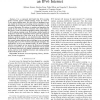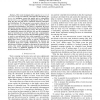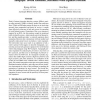5 search results - page 1 / 1 » The effect of DNS delays on worm propagation in an IPv6 Inte... |
INFOCOM
2005
IEEE
14 years 4 months ago
2005
IEEE
— It is a commonly held belief that IPv6 provides greater security against random-scanning worms by virtue of a very sparse address space. We show that an intelligent worm can ex...
IEEEIAS
2009
IEEE
14 years 5 months ago
2009
IEEE
A computer worm is an autonomous malicious, selfreplicating and propagating piece of code that is able to spread fast in computer networks, exploiting the vulnerabilities it disco...
PADS
2005
ACM
14 years 4 months ago
2005
ACM
Most well-known Internet worms, such as Code Red, Slammer, and Blaster, infected vulnerable computers by scanning the entire Internet IPv4 space. In this paper, we present a new s...
INFOCOM
2007
IEEE
14 years 5 months ago
2007
IEEE
— This work investigates three aspects: (a) a network vulnerability as the non-uniform vulnerable-host distribution, (b) threats, i.e., intelligent worms that exploit such a vuln...
USS
2004
14 years 6 days ago
2004
Today's Internet intrusion detection systems (IDSes) monitor edge networks' DMZs to identify and/or filter malicious flows. While an IDS helps protect the hosts on its l...



